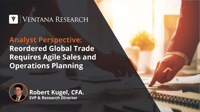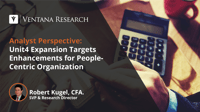“Digital finance transformation” became an even more important topic over the past two years as finance and accounting departments have had to cope with an unrelenting set of new challenges that have had a profound impact on business operations, financial markets and regulatory environments. Digital technologies enable organizations to cope with change and improve performance by increasing efficiency, reducing risk, achieving greater visibility into opportunities, shortening process cycles and...
Read More
Topics:
Office of Finance,
Financial Performance Management,
ERP and Continuous Accounting
Although the digital transformation of the finance department was a topic of discussion before 2020, it became a front-and-center issue as organizations locked down and in-office interactions became impossible. Finance and accounting departments were immediately confronted with a challenge because of their limited adoption of technology that would support a virtual working environment. As our 2019 Office of Finance Benchmark Research found, they are technological laggards: 45% are at the...
Read More
Topics:
Office of Finance,
Financial Performance Management,
ERP and Continuous Accounting
Since its inception 20 years ago, Ventana Research has advocated for a shorter accounting close because it can improve the performance of the entire organization, not just finance and accounting. An important benefit of a shorter close is increased staff time for analysis and the preparation of reports and narratives that improve communications with the board and outside investors. Similarly, the department can provide those in operating roles the financial and managerial accounting results to...
Read More
Topics:
Office of Finance,
Financial Performance Management,
ERP and Continuous Accounting
We conducted our recent Smart Close Dynamic Insights Research in part to assess to what extent the substantial disruptions of the pandemic have impacted the accounting close. When office lockdowns began in the first quarter of 2020, many finance departments were challenged by having to do their quarterly close remotely without their normal face-to-face interactions. In the United States, the Securities and Exchange Commission was so concerned that corporations would be unable to meet their...
Read More
Topics:
Office of Finance,
Financial Performance Management,
ERP and Continuous Accounting
OneStream offers a platform designed to serve the needs of accounting and financial planning and analysis organizations. The software handles financial close and consolidation, planning and budgeting, analysis and reporting. For me, the most significant announcement at the company’s recent user conference was the unveiling of its Sensible ML (Machine Learning) offering, which is in limited general release. I’ve commented on the importance of artificial intelligence in business applications, and...
Read More
Topics:
Business Planning,
Financial Performance Management,
ERP and Continuous Accounting,
AI and Machine Learning
A few years ago – somewhat tongue in cheek – I began using the term “data pantry” to describe a type of data store that’s part of a business application platform, created for a specific set of users and use cases. It’s a data pantry because, unlike a general-purpose data store such as a data warehouse, everything the user needs is readily available and easily accessible, with labels that are immediately recognized and understood.
Read More
Topics:
Data Management,
Business Planning,
Financial Performance Management,
ERP and Continuous Accounting,
AI and Machine Learning
Sage recently announced that it is expanding its Sage Intacct software offering to support discrete manufacturing, with its initial foray into this competitive market centered in France. The move supports the company’s strategy of building out the scope of industries served by its cloud applications to include product-oriented business models and expanding Sage Intacct’s geographic footprint. The company has been extending the functionality it offers customers with human capital management as...
Read More
Topics:
Office of Finance,
ERP and Continuous Accounting
I first wrote about a new era of trade a few years ago to make the point that the period of optimizing supply chains for the lowest cost was over, and that companies needed to redesign them to achieve greater resiliency. That observation proved correct. Now we are hearing about “the end of globalization,” a hyperbolic phrase describing the effects of ongoing changes to the international political order that have been underway for more than a decade. These changes are forcing companies to make...
Read More
Topics:
Continuous Planning,
Business Planning,
Financial Performance Management,
Enterprise Resource Planning,
ERP and Continuous Accounting,
continuous supply chain
I recently attended an analyst conference held by Unit4, an enterprise resource planning vendor focused on midsize organizations in people-centric industries. The conference was intended to communicate the company’s strategy, product updates and roadmap. The meeting took place shortly after announcement of the availability of Unit4 Industry Mesh and the acquisition of Compright, which does compensation planning as well as in the context of the broad technology shifts affecting ERP applications.
Read More
Topics:
Human Capital Management,
Office of Finance,
Business Planning,
Talent Management,
Financial Performance Management,
ERP and Continuous Accounting,
Total Compensation Management
Software that automates the full scope of the accounting close, including reconciliations, consolidation and reporting, has grown more capable and affordable over the past five years. By enabling consistent process management that captures best practices, and by automating rote, repetitive activities to boost staff productivity, these applications enable organizations to shorten the close, make the process more efficient and reduce the risk of material errors by strengthening accounting...
Read More
Topics:
Office of Finance,
Financial Performance Management (FPM),
ERP and Continuous Accounting




















